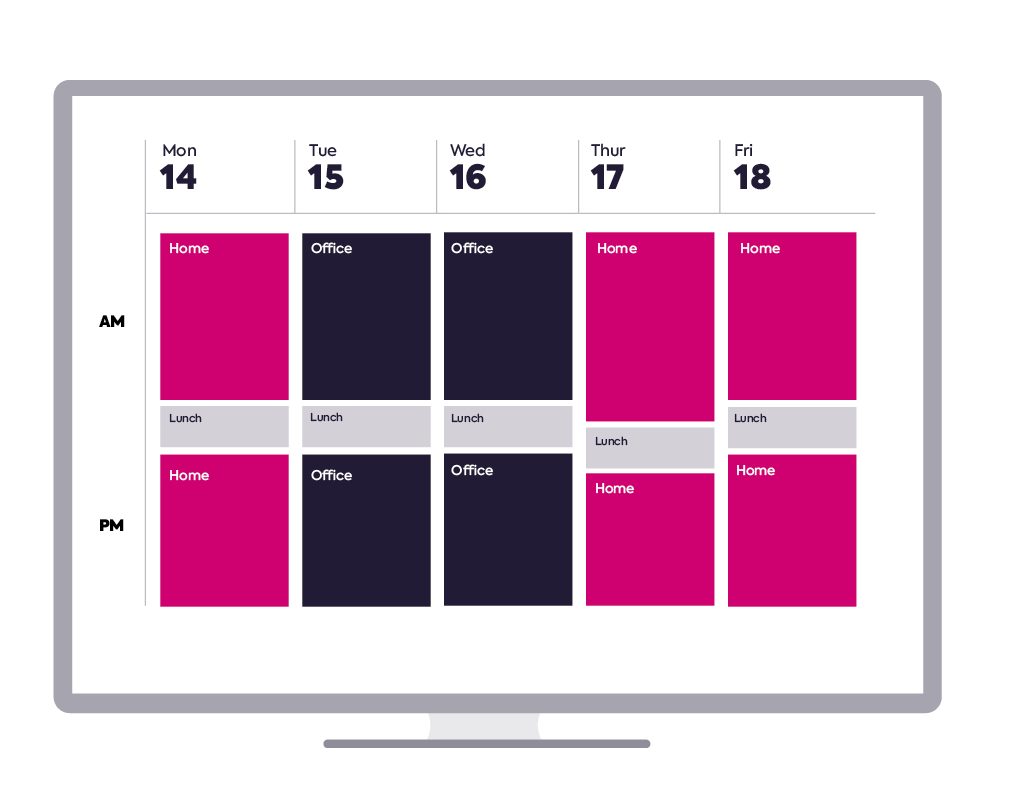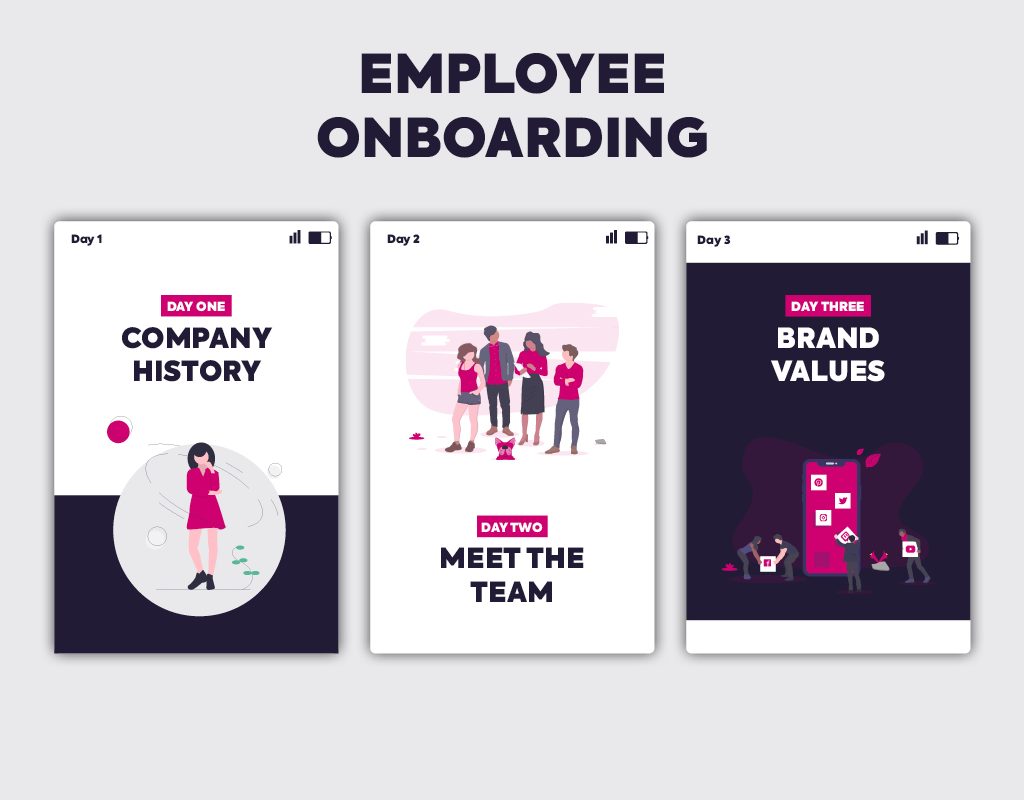- Home
- Our Solutions
Titus Services
Unlock Moodle's Potential with Titus
Migrate to Titus and transform how you use Moodle in your organisation. - Industries
- Our Work
- About
- Blog


Home - Blog - e-Learning Advice - We asked our team what they thought about Hybrid working – Here’s what we learnt
At Titus, we’ve embraced hybrid working since day one. Like many tech entrepreneurs before them our co-founders Seb and Mike started the business from their bedrooms/ livingrooms/ park/ beach (basically wherever they had wifi). As Titus grew, they were keen to ensure that flexibility remained a core Titus value.
Then came Covid and our flexible hybrid working very squarely became home working and with that a loss of the human touch that we all realised was so important to our team.
Now that restrictions are lifting, we’re looking forward to returning to a work life with more balance combining face-to-face and remote working.
In this article, we’ve asked Titus team members from different positions within the organisation to share their thoughts and experiences of hybrid working in an effort to help other businesses transition to their own hybrid model.
01 How should leaders embrace hybrid work?

Seb Francis Co-founder & Director
I divide my time between the UK and our satellite office in Dubai, so the hybrid model is not really a new thing for me. The rapid transition to remote working due to the pandemic raised a lot of challenges, but as a technology and learning focused company, I think we were fortunate in our ability to pivot quickly.
I’m keen to move back towards more in-person collaboration – I don’t think there’s a substitute for that – but I’m also glad we’re able to retain some of the flexibility and agility that comes with remote working, giving our whole team more ownership of their schedules.
Some colleagues prefer a 50:50 split of remote to in-person work, some prefer a bias one way or the other. As far as possible people should be able to decide what works best for them.
“Video conferencing is invaluable for bringing together remote teams, but be careful not to overdo it. After 2 or 3 hours of video calls in a day we all start to feel a little burned out. Sometimes a quick phone call or email is more appropriate.”

Co-founder & Director
02 You need to make a conscious effort to be tuned into your teams welfare
Luke Tillotson Head of Sales
A big part of my role is motivating and mentoring the team, and learning to do that remotely can be challenging – you miss the aspect of non-verbal communication. I think the hybrid model works best when location is matched with purpose.
Remote working is ideal for giving colleagues the freedom to focus on individual projects, but then coming together in person for planning sessions, reviews or briefings is valuable.
Making sure the team (and myself) keep reasonable working hours, and ensuring that remote work doesn’t overtake their home life. Burnout can creep up much more easily when face-to-face time is limited.
“The welfare of your team has to come first. Check in regularly to make sure colleagues aren’t over stretching, and keep business communications to office hours only – even if messages don’t require an immediate response they can still contribute to stress.”

Head of Sales
03 It’s easy to get stuck in a rut – don’t underestimate the importance of the “water-cooler”

As a coder, you might think my role lends itself well to remote working – headphones on, deep in focus. There’s certainly an element of that – sometimes the distractions of an open-plan office aren’t ideal when you really need to concentrate.
But we’re a collaborative team – not only among ourselves within production, but also liaising and communicating with other departments. Zoom or Slack are valuable tools for staying in touch, but regular face-to-face sessions are vital to a healthy working environment.
Finding the balance between allowing yourself and your team the space to focus on core work, while still building in regular check-ins to make sure everyone is coping well and feels supported.
“Those ‘water-cooler’ chats which are so common in office life are important for remote workers too. Work out a schedule which allows some virtual downtime during the working day for teams to catch up, swap ideas and share advice.”

04 Sometimes it’s better to work from home, but it can make collaboration harder
Jessica Crow Customer Success Manager
Working with clients around the world, a hybrid working model is a good fit, as it allows us more flexibility in scheduling training or project planning sessions. Cutting out commute times and being able to work a split schedule is especially useful when dealing with time-zone differences.
A hybrid model allows you to take advantage of that convenience when needed, while retaining the collaborative and social benefits of working from the office part of the time. From a customer perspective, having a flexible schedule helps us to maximise focus and deliver a better service overall.
For team members dealing with our clients remotely, it’s vital they have the right audio/video equipment and internet connectivity to be able to offer the same high standards of communication and service as office-based staff.
“Plan ahead – schedule the most appropriate tasks for your in-office or remote time respectively. I prefer holding one-to-one customer calls from the home office, for example, whereas I get more value from attending team meetings at our HQ.”

Customer Success Manager
05 Onboarding virtually brings unique challenges – make sure to make time to get to know your new colleagues

Dec Connolly Digital Marketing and Web Manager
I joined Titus in early 2020, just as the lockdown and associated restrictions were coming into effect. My “virtual” induction process was therefore a learning experience, both for me and my new colleagues.
Doing it remotely was a necessity at the time, but in general I’d say the hybrid model is much better for onboarding. Face-to-face time is crucial for making those initial connections, while remote work, using an LMS, is ideal for getting to grips with product knowledge, policies, brand identity etc.
In my role, I work with colleagues, partners and contractors in a variety of locations. When we are able to get together in person, it’s really important to make the most of the time, with a predefined agenda to ensure we hit the ground running.
“As a new starter, make time to connect with remote working colleagues in the same way you would with those you meet at the office – not just for knowledge sharing, but to get to know them on a personal and social level.”

Digital Marketing and Web Manager
06 Managing the work space when some of your team are at home
Ruth Coope Business Services Assistant
Part of my role includes managing how we use our office space. Off the back of the pandemic, this meant reconfiguring the space and putting in place careful scheduling to ensure a safe environment with a limited number of people using the premises at one time.
Looking to the future, we’re focusing more on how team members will use the space within the context of hybrid working, as well as ensuring we have the technology in place to allow remote workers to collaborate effectively.
Ensuring that remote workers are just as involved in all aspects of the business as office-based colleagues – not only in terms of our day-to-day work, but also the social or charitable activities we’re involved in.
“If you’re moving to hybrid working, it’s a great opportunity to rethink the purpose of your office environment. With less need for desk space, you can look at creating a more comfortable, configurable environment which prioritises collaboration rather than individual work.”

Business Services Assistant
In our next article on hybrid working, we’ll be looking at balancing the benefits and challenges of the hybrid model from an organisational perspective.
In the meantime, if you’re looking for advice on how online learning can help manage and support employees as you move towards a hybrid learning model, get in touch with one of our team.

Privacy Policy | Cookie Policy | Data Protection Policy | Equality, Diversity and Inclusion Policy
© 2023 Titus Learning LTD | Company Number 08799881 | VAT Number 1813 09027
Super talented, unflappable and very funny, Phuong supports the whole marketing team in her role as Digital Marketing Executive. Phuong holds a bachelor’s degree in Business Administration and recently completed a master’s degree in Management and Marketing. Originally from Hanoi in Vietnam, Phuong is now based in the UK and climatising brilliantly to our weather and food.
Phuong owns a food review Instagram page as travelling and food are her passion. She also has a cute little french bulldog.
Ellie was the first woman to join Titus and has paved the way for many more since then. After studying for a degree in Fashion and Marketing, Ellie was lucky to find herself at fashion weeks and photoshoots.
Now she’s switched from talk of the front row to front end design and has brought loads of transferable knowledge to Titus. Ellie has also found a real passion for tech, especially in the learning sector, helping clients create positive change for their organisations.
As one of the youngest people at Titus but at the same time one of the oldest serving members of the team, Callum has graced Titus with his broad smile and positive attitude for over 5 years now. As a key member of the marketing team, Callum works across all areas, both on and offline, to ensure that all Titus brands and communication are on point.
After missing out on the opportunity to go to University the first time around, management encouraged him to enrol in our course alongside his work. He is now studying to achieve his Level 6 Diploma in Professional Digital Marketing.
Always bringing innovation and new ideas, Dec studied a degree in Journalism but found his passion in digital marketing. Dec has also worked in marketing for one of the countries biggest retailers and within the property sector.
Outside work, Dec Co-founded a news publication where he collaborated with global brands like Uber, Amazon, BooHoo and countless SMEs.